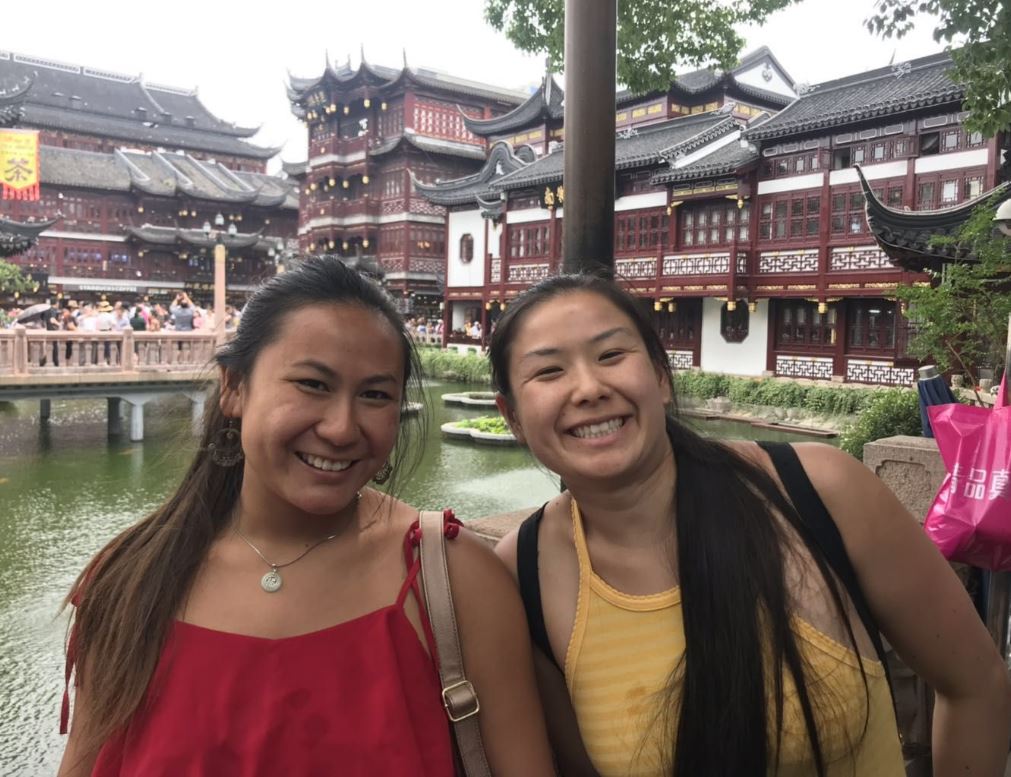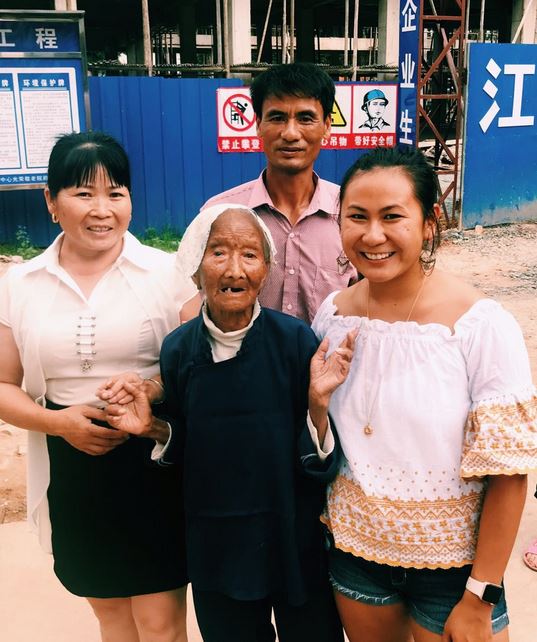
By Olivia Wolf
Almost a year after discovering the existence of her Chinese birth family, 19-year-old Kaylena Wiederhold boarded a plane to acquaint herself with the country and the people that she had left behind as an infant. On May 7, the small-town teenager from Michigan landed in Beijing with four members of her adoptive family to begin a three-week exploration of her birth country.
“I felt like I was entering a whole new dimension,” Wiederhold said of the culture shock to AsAmNews. “Everything was different, except for the technology.
For the first ten days, Wiederhold traversed China on a tour planned by adoption agency Lotus Travel with her adoptive mom, dad, older sister, and her sister’s boyfriend to learn about the country’s history and culture. They toured popular destinations, including the Chengdu Panda Base and Mount Emei in Sichuan, her sister’s birth province.

Exhausted from traveling four to five hours each day, Wiederhold was nonetheless feeling upbeat and positive the day that she and her adoptive family reached their hotel at Ruijin City in Jiangxi Province where her birth family was waiting inside the lobby.
Before that day, Wiederhold had imagined various scenarios of what that moment might look like. She envisioned both families bursting into tears upon sight and presumed that all would finally settle into place.
However, reality proved to be somewhat different.
“When I met them all the nerves went away,” Wiederhold remembered. “And then it just felt like… people.”
Her birth parents, a cousin, and the aunt and uncle who originally found her “searching flyer” were all there. Though they hugged, it was only her adoptive mom who cried.
“I think it’s right to be honest,” said Wiederhold. “It’s kind of like meeting any other person and then trying to call them Mom and Dad. It’s not something that you can realistically do that easily.”

That night, the families joined together at a restaurant for dinner, which included chicken feet and other delicacies. Afterwards, they drove to the small, rural town Xiefang where Wiederhold’s birth family resided in a multi-family two-story housing complex with sparse rooms built of cement, reminiscent of a garage. It was there that Wiederhold first met her birth siblings, the relatives she had been in contact with most often since discovering her family’s existence.
“It felt like a TV show, and I haven’t fully recovered,” said Kaylena’s younger birth sister, Liu Jinfeng, to AsAmNews. Growing up, she would often overhear her parents fighting about her mysterious long-lost sister. “I’m so happy and excited; I can’t believe I found her.”
In line with the hospitality that Chinese families often demonstrate towards special guests, Wiederhold’s birth family arranged for a multi-course feast the following night. Almost seventy guests were present, including extended family members, friends, and neighbors. Some people dropped by just to glimpse the Americans visiting their small town.

Over the next three days, Wiederhold and her birth family spent most of their time in silence as they motorbiked through mountains, hiked the countryside, and shopped in town. Although they could usually communicate with either an interpreter or a translating app, her birth family rarely asked her any personal questions. Whether that was due to cultural differences, a lack of interest, or discomfort, Wiedherhold was not quite sure. However, the limited quantity and depth of communication sometimes made it difficult for her to connect with them on a personal level.
Aside from her immediate birth family, Wiederhold also wanted to meet the 96-year-old woman who had cared for her during the ten months that she lived at the retirement home before her adoption. At the time, the retirement home lacked the resources to buy baby formula. To compensate, the woman, an alleged distant relative, would chew up rice and spit it into Wiederhold’s mouth like a mother bird to a chick.

At the retirement home, the old woman smiled and placed her hands on Wiederhold’s arms. She spoke few words, and what words she did say were in a dialect often too difficult for the translator to understand. When Wiederhold said goodbye to her, she knew it might be one of her last chances to thank the person who had kept her alive and healthy during those early stages of life. And for the first time since landing in China, Wiederhold allowed herself to cry.
Throughout her visit, Wiederhold continued to fill in the gaps of her own origins story by listening to the stories of her relatives. There were two other pregnancies before her: one that resulted in her eldest sister and the other that never resulted in anything. Because of the One-Child Policy, officials demanded a steep fine for the life of the second child, which the father, who made less than a dollar a day, could not afford. Eventually, the officials dragged Wang Sheng Jiao to the clinic and forced her to abort her seven month fetus.
When Wiederhold was conceived, her mother hid at her in-laws’ house until she gave birth to her third child, who was quickly ushered to the old folk’s home. Despite the cover-up, word spread of her new child and police soon arrived at the family’s doorsteps. To the officers’ outrage, both Wiederhold and her mother were nowhere to be seen. As punishment, they confiscated everything of value in their home.
In the end, the police prevailed, and Wiederhold was forced into an orphanage and sent to the United States, where she would spend the next 18 years of her life, leading the Asian Cultural Organization at college and conducting free pregnancy testing for women, unaware of the existence of her mother and father in China who still hoped to one day find their daughter.
“We always wondered why she was abandoned,” Kaylena’s adoptive mom, Laurie Wiederhold, reflected. “But as we found out more and more of the story, we realized that’s not what happened at all.”
On the other side of the world, Wang Sheng Jiao became pregnant with another daughter and subsequently a son. Determined to avoid losing any more children, the couple took advantage of a seemingly significant loophole. With the question of paternity up in the air, the One-Child Policy would no longer apply to them. They divorced, but in name only. The two continued to work as migrant construction workers, giving birth in different provinces to further decrease their chances of exposure.

Although Wiederhold had planned to return to the hotel with her adoptive family each night, she ended up spending all three nights with her birth family–slumber party style. Her mother and cousin shared a bed with her, while her brother dozed on the floor. In the middle of one night, Wiederhold woke up with her cousin’s foot pressed to her face. Another night, Wiederhold woke up to use the bathroom, and her mother, not knowing what she needed, followed her and waited.
Now back at Central Michigan University, Wiederhold hopes to visit her family in China again next year. Of her plans to learn Chinese she says, “I want to. I’m going to. Yeah… it’s just going to be really hard.”
AsAmNews has Asian America in its heart. We’re an all-volunteer effort of dedicated staff and interns. Check out our Twitter feed and Facebook page for more content. Please consider interning, joining our staff or submitting a story


RE: Adoptee meets Chinese Birth Family: My daughter who is 20 was adopted from Anhui province and would like to find her birth family. Do you have any suggestions?
RE: Adeoptee meets Chinese birth family: To get going you could join some of the searching groups on Facebook. There are also several organizations such as My Taproot and DNA Connect, although I am not endorsing any companies since I’ve have heard mixed experiences about some of them. You could submit your DNA to databases, such as 23andMe as well. Some people choose to hire a professional searcher (like in the above case), make flyers, visit the orphanage/police or go to the Chinese media. Once you start joining groups, people will be able to connect you to more specific people. Best of luck!